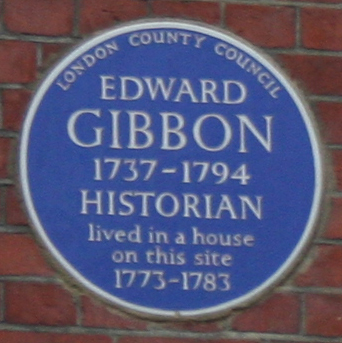I understand by this passion the union of desire, friendship, and tenderness, which is inflamed by a single female, which prefers her to the rest of her sex, and which seeks her possession as the supreme or the sole happiness of our being.
Meaning of the quote
This quote is describing the powerful feeling of love. Love is a mix of wanting someone, caring for them deeply, and feeling very close to them. When you love someone, they become the most important person in your life, and being with them is the greatest happiness you can have.

About Edward Gibbon
Edward Gibbon was an influential English essayist, historian, and politician. He is best known for his magnum opus, ‘The History of the Decline and Fall of the Roman Empire’, which showcases his mastery of prose, use of primary sources, and critical analysis of organized religion.
More quotes from Edward Gibbon
Let us read with method, and propose to ourselves an end to which our studies may point. The use of reading is to aid us in thinking.
English historian and politician (1737-1794)
I am indeed rich, since my income is superior to my expenses, and my expense is equal to my wishes.
English historian and politician (1737-1794)
The author himself is the best judge of his own performance; none has so deeply meditated on the subject; none is so sincerely interested in the event.
English historian and politician (1737-1794)
My English text is chaste, and all licentious passages are left in the decent obscurity of a learned language.
English historian and politician (1737-1794)
Revenge is profitable, gratitude is expensive.
English historian and politician (1737-1794)
The pathetic almost always consists in the detail of little events.
English historian and politician (1737-1794)
I understand by this passion the union of desire, friendship, and tenderness, which is inflamed by a single female, which prefers her to the rest of her sex, and which seeks her possession as the supreme or the sole happiness of our being.
English historian and politician (1737-1794)
Books are those faithful mirrors that reflect to our mind the minds of sages and heroes.
English historian and politician (1737-1794)
The style of an author should be the image of his mind, but the choice and command of language is the fruit of exercise.
English historian and politician (1737-1794)
The various modes of worship which prevailed in the Roman world were all considered by the people as equally true; by the philosopher as equally false; and by the magistrate as equally useful.
English historian and politician (1737-1794)
We improve ourselves by victories over ourselves. There must be contest, and we must win.
English historian and politician (1737-1794)
The end comes when we no longer talk with ourselves. It is the end of genuine thinking and the beginning of the final loneliness.
English historian and politician (1737-1794)
Every man who rises above the common level has received two educations: the first from his teachers; the second, more personal and important, from himself.
English historian and politician (1737-1794)
A heart to resolve, a head to contrive, and a hand to execute.
English historian and politician (1737-1794)
I was never less alone than when by myself.
English historian and politician (1737-1794)
All that is human must retrograde if it does not advance.
English historian and politician (1737-1794)
Of the various forms of government which have prevailed in the world, an hereditary monarchy seems to present the fairest scope for ridicule.
English historian and politician (1737-1794)
Corruption, the most infallible symptom of constitutional liberty.
English historian and politician (1737-1794)
Unprovided with original learning, unformed in the habits of thinking, unskilled in the arts of composition, I resolved to write a book.
English historian and politician (1737-1794)
My early and invincible love of reading I would not exchange for all the riches of India.
English historian and politician (1737-1794)
Fanaticism obliterates the feelings of humanity.
English historian and politician (1737-1794)
The laws of probability, so true in general, so fallacious in particular.
English historian and politician (1737-1794)
Style is the image of character.
English historian and politician (1737-1794)
History is indeed little more than the register of the crimes, follies, and misfortunes of mankind.
English historian and politician (1737-1794)
History is little more than the register of the crimes, follies, and misfortunes of mankind.
English historian and politician (1737-1794)
Beauty is an outward gift which is seldom despised, except by those to whom it has been refused.
English historian and politician (1737-1794)
Conversation enriches the understanding, but solitude is the school of genius.
English historian and politician (1737-1794)
Our work is the presentation of our capabilities.
English historian and politician (1737-1794)
It has always been my practice to cast a long paragraph in a single mould, to try it by my ear, to deposit it in my memory, but to suspend the action of the pen till I had given the last polish to my work.
English historian and politician (1737-1794)
I never make the mistake of arguing with people for whose opinions I have no respect.
English historian and politician (1737-1794)
Their poverty secured their freedom, since our desires and our possessions are the strongest fetters of despotism.
English historian and politician (1737-1794)
The principles of a free constitution are irrecoverably lost, when the legislative power is nominated by the executive.
English historian and politician (1737-1794)
Our sympathy is cold to the relation of distant misery.
English historian and politician (1737-1794)
Hope, the best comfort of our imperfect condition.
English historian and politician (1737-1794)
The winds and the waves are always on the side of the ablest navigators.
English historian and politician (1737-1794)
The courage of a soldier is found to be the cheapest and most common quality of human nature.
English historian and politician (1737-1794)
But the power of instruction is seldom of much efficacy, except in those happy dispositions where it is almost superfluous.
English historian and politician (1737-1794)